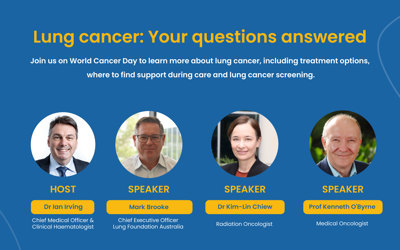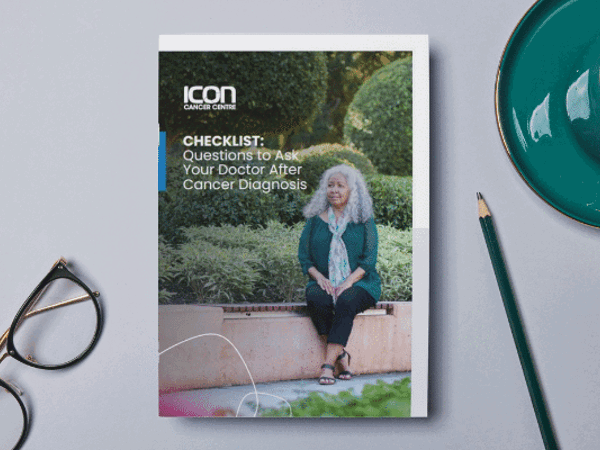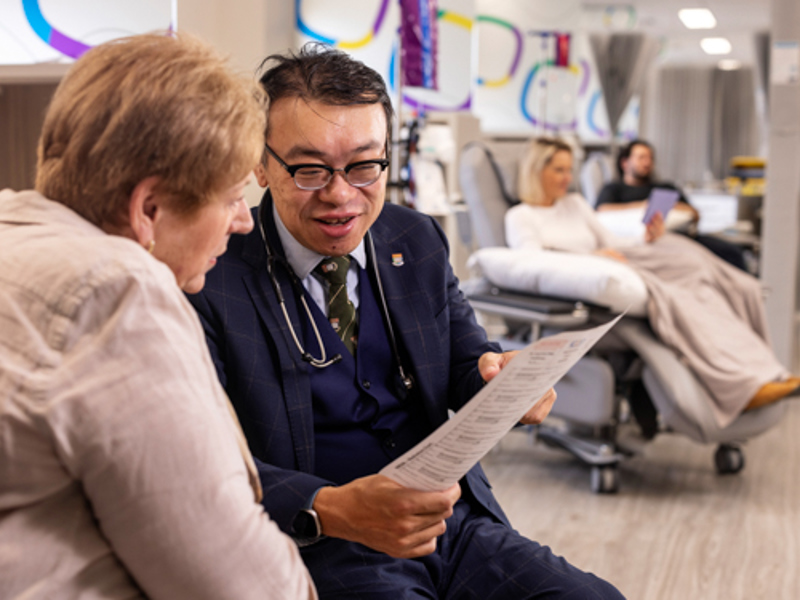
Icon Cancer Centre Facebook Live: Lung Cancer
While you’re coming to terms with a new diagnosis, you may also need to make important decisions, such as whether you want to receive treatment through the public system or in a private setting.
You can receive excellent care in both public and private settings; however, one option may be better suited to your individual needs, lifestyle, family, work life, financial circumstances, and personal preferences. Many people don’t realise that you can combine public and private services based on what works best for each aspect of your treatment, such as accessing public facilities for certain treatments and private ones for others.
We’ve outlined some key considerations and questions you can ask when choosing your treatment path.
Be more informed and play an active role in your own cancer care.

Understanding the potential wait times for starting treatment is crucial. Public hospitals may have longer waiting times for non-emergency treatments and consultations, which might affect the timing of your care, depending on demand in your area.
Private facilities often offer quicker access to treatments and consultations, due to the higher availability of specialised care and resources. Most private centres aim to minimise or eliminate wait times.
Shorter waiting times may not necessarily improve the outcome of your treatment, but they can reduce anxiety or anticipation. Your doctor can help you understand the expected wait times for your treatment plan, so you can make an informed decision that aligns with your personal health needs and priorities.
In the public system, you may have less control over which specialist or oncologist you see, as this is typically based on availability. You may see different doctors throughout your treatment, and registrars (advanced trainees) may also be involved in your care. However, this approach can provide you with a broader range of support from a multidisciplinary team.
In a private setting, you have more control over your choice of specialists, which can be important in finding a good fit for your needs. This typically means you will see the same doctor from your initial consultation through to your final treatment and follow up care. This continuity of care may come with potential cost differences.

Both public and private sectors offer access to a range of services and technologies, though the availability can vary based on where you live and the specific facility.
Public hospitals often provide comprehensive treatment options, including access to clinical trials and coordinated care across various services within the public health system. However, the availability of these services is generally concentrated in larger hospital precincts, which may require patients in outer metropolitan or regional areas to travel for treatment.
Private centres may invest in cutting-edge equipment and techniques, providing access to the latest advancements in cancer treatment. Many private centres are located outside large hospital precincts, allowing patients to receive care closer to home, which can be more convenient.
Out-of-pocket costs are expenses for your cancer treatment that aren’t covered by Medicare or private health insurance.
These costs can include:
Doctor consultations
Treatments
Medications
Imaging scans and tests
Public System: Medicare typically covers most treatment and service costs in public hospitals, which can include allied health services within the public network. However, these services are generally located in metropolitan or base hospitals, which might require some patients to travel.
Private System: Out-of-pocket costs in private care can vary based on your health insurance policy and the type of treatment.
For example, radiation therapy is largely funded by Medicare, with up to 90% of the fee covered, even in private facilities. However, private health insurance is typically required for chemotherapy and similar treatments, and your out-of-pocket expenses will depend on your insurance coverage.
Convenience can be an important factor when choosing between public and private care.
Private centres often aim to provide a more convenient experience, with locations closer to home or work and appointment times that may be scheduled to suit your preferences. This flexibility can help you manage your life around treatment more effectively.
Public hospitals may have more rigid appointment times, and depending on where you live, longer travel distances. However, public hospital campuses, especially in metropolitan areas, often offer comprehensive onsite care, including allied health services, which can be convenient if you require multiple types of care in one location.
Talk to your family and doctor to ensure you understand your options. Your personal situation, health insurance status and diagnosis can help guide your decision. Taking the time to understand your options can help you make informed decisions and navigate your treatment with confidence and peace of mind.
Please note, the information in this article is general of nature and may not be reflective of every public or private setting. It may also vary based on factors including where you are treated and the type of cancer you have. We encourage you to discuss your options with your doctor to make an informed decision that is right for you.
These questions are designed to help you consider both clinical and personal factors when deciding between public and private treatment options. Remember, these questions are just one part of the decision-making process. It’s important to discuss them with your healthcare provider, who can help you understand the implications of each answer and how they relate to your specific situation.
What are the success rates and clinical outcomes of the treatments available to me in both public and private settings for my type of cancer?
How does the level of specialist expertise in each setting impact my treatment and follow-up care?
Are there specific treatments, technologies, or clinical trials available in one setting that might not be available in the other?
What treatment options and medications are accessible in both public and private settings?
What support services and cancer care resources, including cancer care nurses, are available in each setting?
What is the cost difference between public and private care for the treatment I need?
How much will my private health insurance cover, and what are my out-of-pocket costs?
Are there financial assistance programs or subsidies that can help with costs?
How will the timing and frequency of payments fit with my financial situation?
What is my ideal timeline for starting treatment?
What are the expected wait times in public vs. private settings?
How does the urgency of my treatment affect my choice between waiting times?
How might different wait times impact my well-being and treatment effectiveness?
Is it important for me to choose my doctor, or am I comfortable with being assigned one?
Would I prefer to see the same doctor throughout my treatment, or am I okay with seeing different doctors?
Am I comfortable with registrars or trainees being involved in my care, if applicable?
What is the expected duration of each treatment session, and how many sessions will I need?
How long might I need to stay at the treatment centre?
Which treatment location is most convenient considering my daily routine and support network?
How far would I have to travel for treatment, and how might that affect my overall well-being and finances?
These questions are intended to guide your discussions with your healthcare provider and help you make a decision that aligns with your individual needs and circumstances. Keep in mind that your personal values, lifestyle, and health status are crucial factors in determining which questions are most important to you. It can also be helpful to bring these questions to your consultation with a family member or advocate who can assist you in processing the information and making a more informed decision.
The content on the Icon Cancer Centre website is for informational purposes only and should not be considered medical advice. It is not a substitute for consultation with a qualified medical practitioner. For personalised medical guidance, please consult with your GP or another qualified healthcare provider.

Discover our comprehensive collection of content designed to inform, support, and guide you through every aspect of cancer care. From the latest news and updates to personal patient experiences and educational resources, these materials provide valuable insights to help you better understand cancer, treatment options, and the journey ahead.